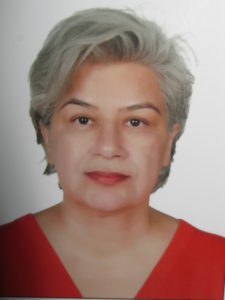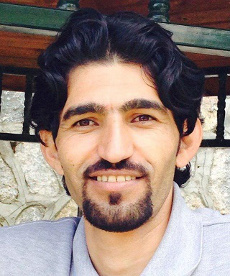For How Long Can Injustice Last?
On the 16th of September, Iranian human rights activist Mansoureh Behkish* went to Tehran International airport with her bags packed for a 3 month visit to Ireland. Ms. Behkish’s beloved mother had passed away in January of this year, and after settling her affairs, Ms. Behkish was looking forward to some peace and quiet in the company of her daughter, who lives in Dublin. But she never made it to Dublin, because moments before the plane was to depart, Iranian authorities pulled her from the departure lounge, and confiscated her passport. She has been told that if she wants it back, she needs to report to a court that resides in the same complex as the notorious Evin Prison, where Ms. Behkish has several times been incarcerated for her human rights advocacy work. This is not the first time she has been stopped from leaving the country. Below, Ms. Behkish writes an open letter on her experience:
For How Long Can Injustice Last?
The authorities of the Islamic Republic of Iran think that if they harass the families of the executed and disappeared, they can bar our path to justice. Such a delusion! They fail to realise that oppression cannot endure forever. One day the truth about what they have inflicted on us will be revealed, and the oppressors will be held accountable and punished for what they have done.
It is true that since the beginning, by terrifying and terrorizing the Families, the Iranian regime has forced some to retreat, or live in isolation. But this situation cannot continue forever. Every day we witness not only the Families’ calls for truth and justice, but we also hear the voices of past and present Iranian regime members confirming evidence that the state has committed heinous crimes.
On Friday, 16th of September, I was heading to Ireland. The trip was supposed to calm me and cheer me up, as I have had a very hard time recently; particularly after losing my beloved mother in January. I have not got used to her absence yet. I wanted to spend some quality time with my daughter in Dublin for a few months, away from all the tensions and pressures in Iran. My daughter is a university professor, so I would have the days free to myself. I had planned to explore the city, visit its greenery and landmarks, and to communicate with people in the city to calm and cheer myself up, and also to improve my English. I also wanted to visit the libraries of the universities, and to familiarise myself with the academic and cultural environments of Ireland. On evenings and weekends, my daughter and I could enjoy each other’s company, relax, and rejuvenate. But unfortunately none of this will happen. The Iranian regime’s security agents at Tehran airport barred me from exiting the country and deprived us of the most simple right: spending time with family.
A similar story happened before in 2009, when I was trying to visit my other daughter who was living in Italy.
Just like in 2009, again the security agents at the airport passport control exit-stamped my passport, suggesting that I was free to leave the country, only to later stop me from getting on the plane. Perhaps they had hoped they would find me in a quiet corner, where they could take me away without anyone noticing. However, as with my attempt to visit Italy in 2009, they had to call my name several times from the loudspeakers. This time, they called me more than twenty times. Finally, they came for me at the boarding gate. When I asked why this was happening, they said, “We are just agents and do not know anything.” So in order to make them and the surrounding people in the airport aware of how the Islamic Republic of Iran has oppressed me and my family, I began to call out the injustices that have been done to us. Everyone’s attention was drawn to me; the other passengers looked alarmed, and started whispering to each other with concern. A few passengers even came toward me to show their support and solidarity. The air was filled with tension, and to control this, the agents had to play one of the popular anthem of the people, “Ey Iran Ey Marz-e Por Gohar” (O Iran, the land of gems abound) from the loudspeakers. They then seized my passport and took me to a room where I was given a letter. The letter asked me to go to the revolutionary court at the Evin Prison for follow-up.
It was that easy for them.
In a matter of minutes, they crushed the plans that had taken me months to organise, and confiscated my passport. They gave me a letter ostensibly to follow up on my passport, but in reality, the letter was to make me appear at Evin Prison’s revolutionary court, so they could interrogate me. It is possible that, during the interrogation, they might arrest me, or threaten me with a heavier sentence, which I would strongly protest. I am aware that resisting injustice and oppression has a price, and I am prepared for it.
In February 2013, when I was summoned to Evin Prison to serve my outstanding sentence, I packed my suitcase and went to the Sentence Enforcement Unit, but they told me to go back home. They gave me no further information on my sentence or on what I could expect next, leaving me in suspense. So my prison suitcase is still packed and ready for any moment when they may wish to call me again. I have now emptied the suitcase I packed for Ireland, and I will post the gifts I was taking to my daughter. I will resume my tension-filled, stifling life in Iran, but I will not bend to the wishes of an oppressive system that does not adhere to any moral standard, or even follow its own rules. I will not pledge to stop my efforts to reach justice.
Once again, they have confiscated my passport. They already did this to me in 2009, and I was not allowed to leave for five years. But what was the result? Could they silence me or stop my activities? Never! The Iranian regime’s security organization must known by now that threats and rights violations will not stop us from pursuing our goals, but will only make us more determined to seek truth and justice.
If the Iranian regime knew even a tiny bit about modern governing, they would allow for small elements of democracy to enter public life. Even if it was for the sake of saving themselves and not improving people’s lives! But instead, they continually crank up the pressure valve on Iranian citizens, and harass and attack the Families of the executed and disappeared. If they had learned from history, they would have known this mode of governing cannot continue, because one day the downtrodden will cease to endure continual oppression, and will rise up, and on that day, the oppressive power will no longer be able to survive.
Mansoureh Behkish
October 2016
*October 2016Mansoureh Behkish is a human rights and women’s rights activist in Iran. Over the last 37 years, she and many members of her family were unlawfully detained and tortured because of their political or social beliefs. She was first imprisoned for one hundred days in 1981 when she was six months pregnant. During the mass executions of political prisoners in the 1980s, she lost her older sister, four of her brothers and her brother-in-law, and has since worked tirelessly to seek truth and justice for all families affected by ‘disappeared’ loved-ones. As a member of ‘The Mothers and Families of Khavaran’ and the ‘Mothers of Park Laleh’, Ms. Behkish has been arrested and interrogated repeatedly for attending commemoration ceremonies for disappeared and executedand asking questions.
**On 4 April 2010 Behkish was charged with “assembly and conspiring with the intent to harm national security” as well as “propaganda against the system”. On July 5, 2012, the Appeals Court combined two parts of her sentence, sentencing her to four years of imprisonment, including three years and six months suspended for a period of five years. On 4 February 2013, following a summons from the authorities, Behkish presented herself at Evin prison to begin her sentence, but upon arrival she was told to go home by the prison officials.

 My Interrogator Said: You Are An Ass, And Asses Do Not Merit Human Rights
My Interrogator Said: You Are An Ass, And Asses Do Not Merit Human Rights